Only the locals can help you find the destination: a small, unknown village called Baiyun, literally translated as white cloud.
That's where Qin Yuefei works and lives.
As the first Ivy League village official in China, the 32-year-old has recently received the annual Touching China award by China Central Television, which recognizes the country's most inspiring role models, in early February.
Graduating from Yale University in 2011, with major in political science and economics, unlike most overseas Chinese students who take up highly paid jobs in New York or Beijing, Qin has been making less than 2,000 yuan a month as a village chief in a remote Chinese rural township for the past six years.
"Lots of people question my decision. Why a Yale graduate came to work in a remote impoverished village? Is he crazy?" says Qin, in a four-floor building, where the village officials have meetings, work and where Qin lives.
"Why not? The food is healthy and safe, the view outside my window is beautiful, and I don't have to pay rent," he jokes.
Qin was born in Chongqing, Southwest China's Sichuan province, to blue-collar parents. His mother, who was good at playing violin and gymnastics, sent Qin to study English when he was two. To give her son better education, she took Qin to study in primary schools in Beijing and Shanghai. With the help of relatives, she pulled through the financial problems.
In 2005, Qin graduated from Chongqing Nankai Middle School, passed the SAT with high scores and got full marks on his TOEFL exam, which enabled him to receive a full scholarship offer from Yale University.
It was the ambition to make a difference for the rural township in China that excited him, the thrill of doing something valuable taking him to the rural China.
"What I learned from Yale is how to find out problems and how to use scientific method to solve problems. Rural China interests me. There are many parents, just like my parents, hoping to offer their children better lives and education. I want to help," says Qin, adding that his parents have always supported of his choice.
He was also inspired by Teach For America, a nonprofit organization founded by Wendy Kopp based on her 1989 Princeton University undergraduate thesis to recruit America's top college graduates to teach in some of the poorest areas of America.
"Sixty percent of the graduates from Yale and Harvard in 2011 applied for the program. Only the best among them can get the job. The number really shocked me. It made me think," he says.
In 2005, the Chinese government started encouraging university graduates to work in China's villages to improve and strengthen rural administration, as well as to create more jobs for graduates. The government offers preferential policy toward graduates who work as village officials, such as getting extra bonus scores in post-graduate exam or civil service exam.
It's good news for Chinese college graduates, who face severe competition for jobs. Qin is among more than 220,000 university graduates who are serving as village chiefs around the country's over 500,000 administrative villages by 2015, according to People's Daily.
It also stirs questions since the generation, born in 1980s, is the first to be born under the China's one-child policy. Without siblings, they grew up being pampered and shoulder great expectations from their families. Their upbringing are heavily influenced by the economic reforms, indulged in mass consumerism and embraced Western pop culture.
Are they willing to live with the hardships in rural areas? Do they go just for the sake of the personal benefits? How much will they contribute to the villages?
Baiyun village in Hunan province. [Photo by Wang Zhuangfei/China Daily]
Qin also faced doubts when he first worked as the head of the Hejiashan village, Hengshan county, Hunan province, in 2011.
He took showers in the summer morning, which was regarded as "wasting water" by the villagers. To fit into the new life and win trust of the villagers, he mastered the local dialect within three months and learned to smoke and drink, which helped him get closer to the local people.
"Before he starts his job, Qin talks with us. He pays respect to our lifestyle and we trust him," says Wang Guangli, head of Baiyun village, which has over 3,000 people with a yearly income of around 10,000 yuan.
During his duty in Hejiashan village, Qin managed to raise more than 800,000 yuan in one year from the government and private donors for local infrastructure, such as the installation of streetlights, improving irrigation facilities and arranging school bus for the children.
"But it's not enough and unsustainable. When I left the village, there will be no donation," Qin says.
Three years later when his contract was up, he turned down the promotion of working in Hengshan county government and was transferred to Baiyun Village as the chief to further realize his ambition.
In 2014, he co-founded Serve For China, a nonprofit organization with a group of Yale and Harvard Chinese graduates, to recruit Chinese university graduates to work in poverty-stricken villages. In 2016, Serve For China recruited the first 30 young Chinese people and Tan Tengjiao is one of them.
The 28-year-old from Hengshan county, Hunan province, graduated from Renmin University and worked as a civil servant in Changsha Public Security Bureau for seven years.
"I am married and have a three-year-old daughter. The stable life as a civil servant was a guarantee. It was a tough decision to make," says Teng, who joined Qin last September.
"First, my job was boring and I wanted to do something challenging. Second, the payment is tempting, 7,000 yuan a month, which doubles my previous salary," he continues. "It turns out to be a worthy try."
They helped the village establish a rural cooperative last October to produce and sell edible camellia oil online.
"The local resources are great treasure. The value of those camellia trees has been ignored but now we make the best use of those trees," says Qin.
By January, the rural cooperative has made over 120,000 yuan by selling camellia oil. More ideas, such as building factory and developing side products, like handmade soap of camellia oil, have been planned.
"The success of the factory will attract young people of the village to return to their hometown and work for the village," says Qin, who is also a deputy to the Hengyang City People's Congress.
One of the collaborators with Serve For China is the media guru Hong Huang, whose brainchild, Brand New China, devotes to promoting Chinese designers' clothing, furniture and household articles.
"These young people see the value of the villages. They set a good example for young Chinese people," says Hong, who will help promote embroidery techniques of Miao ethnic people from Yunnan province, a project under Serve For China, become a fashion brand.
Sleeping five hours a day, Qin lost 15kg after he came to work as a village official. One of his favorite places is the rooftop of his house, where he reads, listens to music and watch the nature. His duty in Baiyun Village will be up in this October but Qin says he won't leave because his work with the rural cooperative just started. He travels a lot these days to have meetings in the county and to negotiate with business partners in Beijing and other cities.
"We are like family," says Bin Hongying, a 70-year-old villager of Baiyun Village, who picked up Qin by riding motorcycle three years when he first came to the village. "He has done a lot for us. We hope that he could find a girlfriend and get married soon."
Qin Yuefei works at the Baiyun village.[Photo by Wang Zhuangfei/China Daily]
Qin Yuefei at his office.[Photo by Wang Zhuangfei/China Daily]
Qin Yuefei's books.[Photo by Wang Zhuangfei/China Daily]
Baiyun village is where Qin Yuefei works and lives.[Photo by Wang Zhuangfei/China Daily]
One of Qin's favorite places is the rooftop of his house, where he reads, listens to music and watches the nature.[Photo by Wang Zhuangfei/China Daily]
Qin Yuefei's desk.[Photo by Wang Zhuangfei/China Daily]
Qin Yuefei studies at his office.[Photo by Wang Zhuangfei/China Daily]
Baiyun village is where Qin Yuefei works and lives.[Photo by Wang Zhuangfei/China Daily]
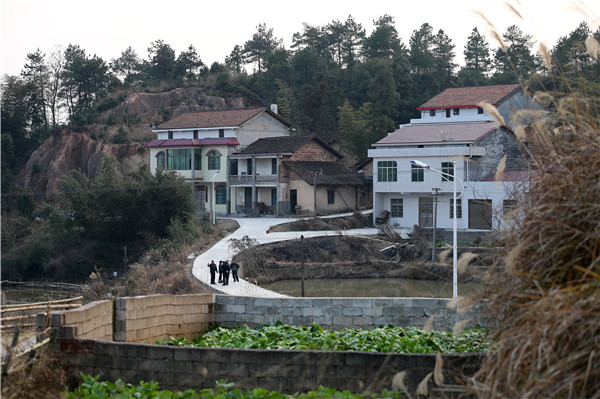
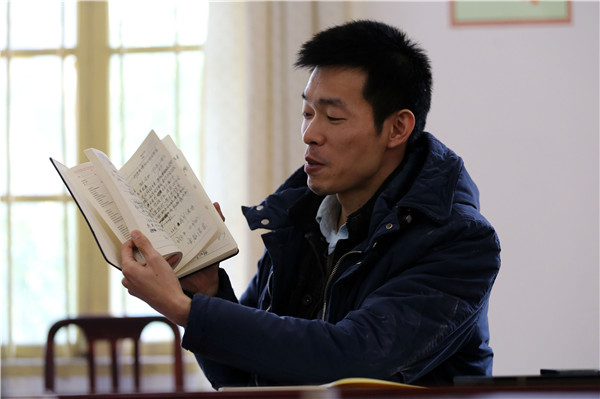
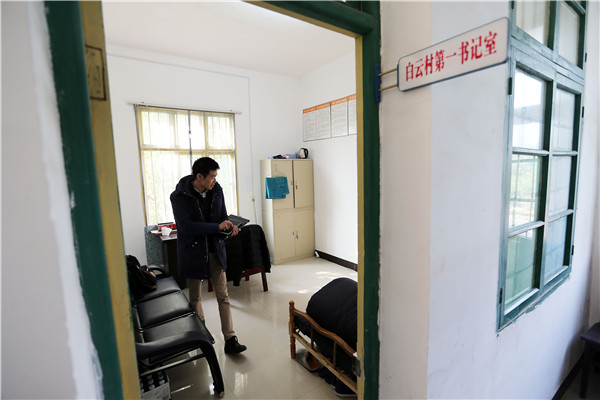

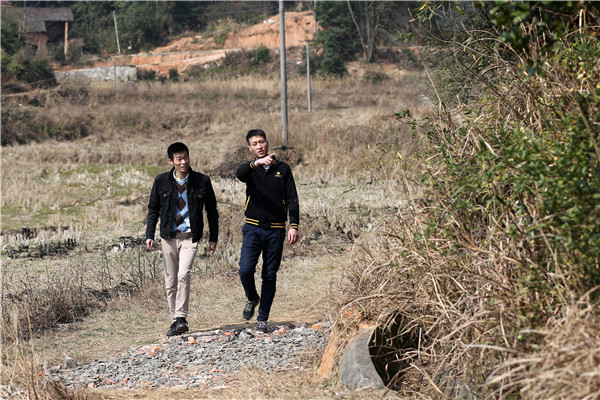
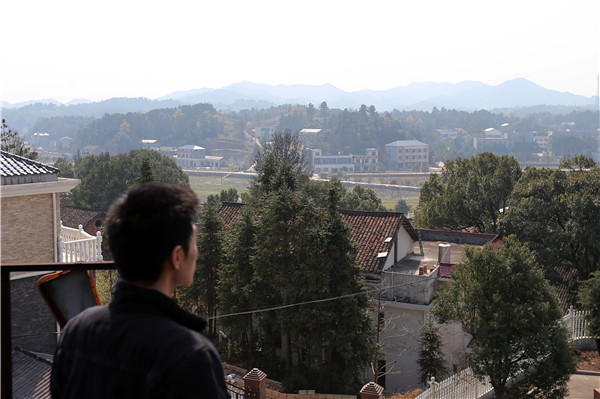
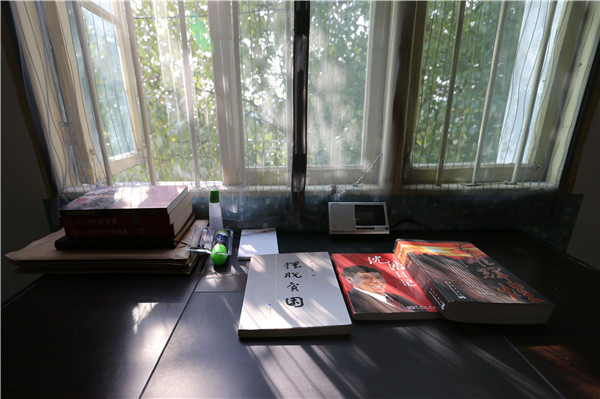
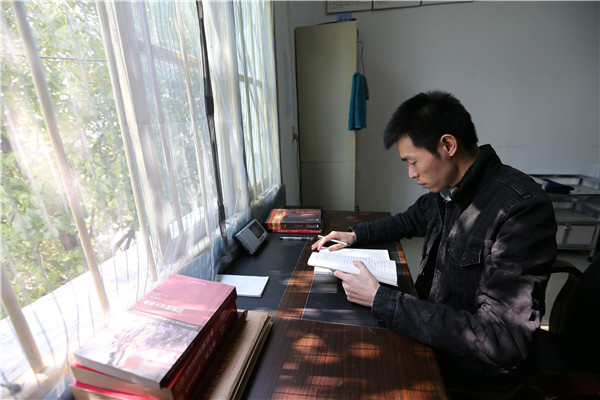
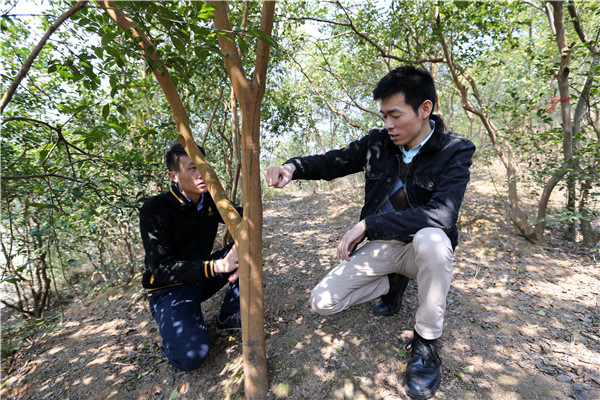
Yale graduate helping transform remote village
Editor:张焕勤
Source:中国日报网
Updated:2017-02-21 08:57:56
Source:中国日报网
Updated:2017-02-21 08:57:56
Special
Contact
Welcome to English Channel! Any suggestion, welcome.Tel:0731-82965627
lisl@rednet.cn
zhouqian@rednet.cn











